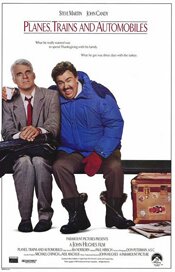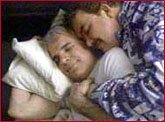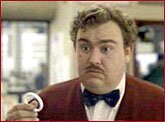There are certain movies I can make a reference to and people immediately know the film and usually recall it with a smile — if not outright laughter. Dirty Rotten Scoundrels is one of those movies. It didn’t change the world of movie making when it came out and didn’t win any awards. It simply did what most movies hope to do: get seen, be appreciated and remembered.
Comedy gem – Planes, Trains and Automobiles
I’ve been prattling about comfort movies recently but so far have suggested only one example from the list I’m compiling. But tomorrow, Thursday, is Thanksgiving in the United States — which may go back as far as 1565, finding its start in Florida. I say “may.” I’m not saying it is so. 
Regardless, that brings me to one of my favourite “comfort movies” of all, Planes, Trains and Automobiles, a movie that is all about Thanksgiving.
Planes, Trains and Automobiles (1987)
 Directed by John Hughes
Directed by John Hughes
Planes, Trains and Automobiles is an absolute gem of a movie. One of the reasons it succeeds so well is because it is so simple and maintains its focus throughout.
Steve Martin (Neal) is heading home to Chicago for Thanksgiving. So is John Candy (Del). They are travellers with personalities at opposite ends: Neal is a prim and proper, an anal businessman, while Del is a talkative, somewhat crass low-rent guy who sells shower curtain rings. Circumstances, increasingly ludicrous yet believable, keep throwing them together. Martin’s character feels nothing but irritation about his situation and with Candy’s character while Candy’s Del is oblivious – he just goes with the flow. Together, they take planes, trains, cars, trucks and so on as they try to get home.
It’s a variation of the buddy, road-movie of film. But I think it shows why these kinds of movies are so popular when they’re well done. It is all about the characters and their relationship. In this case, Steve Martin and John Candy are a perfect pairing. I’ve always liked Martin best when he plays more of a straight character. In this film, he plays straight though this doesn’t mean he’s not comedic. On the contrary, he is more comedic because of this. Everything happens to him and his reactions are priceless.
 Candy, on the other hand, has never been more lovably obnoxious. He’s the boob, the stooge. Always well-intentioned but almost everything he does causes disaster for Martin’s Neal. It’s very much a Laurel and Hardy or Martin and Lewis kind of combination that they play. A lot of the humour is slapstick – visual – and it works well. While many comedies are amusing, I find I don’t often laugh as I watch them, though I may smile. In this movie, I laughed. And that is the litmus test for comedy.
Candy, on the other hand, has never been more lovably obnoxious. He’s the boob, the stooge. Always well-intentioned but almost everything he does causes disaster for Martin’s Neal. It’s very much a Laurel and Hardy or Martin and Lewis kind of combination that they play. A lot of the humour is slapstick – visual – and it works well. While many comedies are amusing, I find I don’t often laugh as I watch them, though I may smile. In this movie, I laughed. And that is the litmus test for comedy.
The film, however, doesn’t work just because of its comedy. And the comedy doesn’t work in a vacuum. The characters created by writer-director John Hughes’ script, and brought to life by Martin and Candy, are what allow everything to play out successfully. It’s in the developing relationship, and the degree of depth the actors give their characters, that guides the movie forward.
The movie isn’t just about getting laughs; it has a theme which is the value of home and relationships. Thematically, it’s similar to It’s A Wonderful Life. It’s not particularly profound; it’s rather simple. But again, this simplicity is part of what allows the film to work and also part of its appeal. It’s accessible and understandable to pretty much everyone. The key in making a movie such as this is avoiding a saccharine quality. This movie, while it may have a wisp of that, doesn’t succumb and this gives it credibility. The humour, too, takes the edge off any hint of sappiness.
 I think, too, there’s something worth an essay or two in the fact that movies like Planes, Trains and Automobiles (and many Capra films like It’s A Wonderful Life) can be and are watched over and over again.
I think, too, there’s something worth an essay or two in the fact that movies like Planes, Trains and Automobiles (and many Capra films like It’s A Wonderful Life) can be and are watched over and over again.
Why is something so simple so compelling? Why do other, more apparently profound films, hard to view more than once without becoming bored, while films like this can be seen again and again? As with children when they want to hear the same story over and over, certain stories, certain themes, address something we need to have repeated for one reason or another. I think it probably has something to do with truth – not the truth of tangible reality, but some truth or truths about us, people, and our relationships with one another.
If you haven’t seen Planes, Trains and Automobiles, or if it has been a while since you’ve seen it, this one is highly recommended. It’s what a comedy should be – funny. In fact the only reservation I have about the movie, the only thing I could find fault with, is the music. It sets the film far too firmly in the 1980’s. If the music were removed, the film is timeless.
But don’t worry – the music isn’t bad. Just anachronistic. And it doesn’t interfere with the enjoyment of the film. (But let me add – I loved the carousel sounding rendition of the Red River Valley song.)
On Amazon:
- Planes, Trains and Automobiles — Video on Demand
- Planes, Trains and Automobiles — DVD, Amazon.com (U.S.)
- Planes Trains and Automobiles — DVD, Amazon.ca (Canada)
2 much Pink Panther?
I’m not sure why, but I keep writing about the Steve Martin Pink Panther movies. A day or two ago I put up an assessment of sorts about The Pink Panther 2.
I think it may be because I was surprised when I liked the first one. I was expecting a mess with that one, as many people did, because it seem such an ill-conceived notion: redoing a role that Peter Sellers had established and more or less owned. All my scribbling was really just me trying to figure out why I felt it worked. What had they managed to do?
My take on The Pink Panther 2 begins this way:
This movie suffers from comparisons. As discussed in my review of Steve Martin’s first The Pink Panther, it gets compared to the Peter Sellers’ movies and that actor’s performances as Inspector Clouseau. This second Steve Martin film, The Pink Panther 2, suffers from the same fate but also from comparisons to the first movie with Martin as Clouseau … (read more)
Pink Panther – Martin as Clouseau
 Now that I’m seeing ads for The Pink Panther 2 (due for release in February, I believe), I thought it might be a good time to discuss The Pink Panther, the 2006 film based on the Blake Edwards and Peter Sellers films. As I recall, when it came out a few years ago it was less than warmly received by the critics. At least, the few reviews I saw were not enthusiastic.
Now that I’m seeing ads for The Pink Panther 2 (due for release in February, I believe), I thought it might be a good time to discuss The Pink Panther, the 2006 film based on the Blake Edwards and Peter Sellers films. As I recall, when it came out a few years ago it was less than warmly received by the critics. At least, the few reviews I saw were not enthusiastic.
So … why do a sequel? According to the numbers, this ill-advised movie did rather well. According to the site The Numbers, the movie cost an estimated $80,000,000. It made, worldwide, $158,926,474. In DVD sales, it made $23,131,141. That’s a total of $182,057,615. So, when you subtract the budget, the movie earned $102,057,615.
A hundred million dollars seems incentive enough to make a movie. This is the cynical view, of course. But movies, certainly Hollywood movies, get made in order to make money. (I shouldn’t have put in the reference to Hollywood. Any filmmaker who manages to drum up financing for his or her film has gotten that financing from people or companies that hope to make money.)
With The Pink Panther, the 2006 edition, we have a movie that was, according to many critics, if not bad certainly not very good. Yet it made over $100,000,000. Apparently someone, somewhere, liked the movie.
I was one of those someones.
Yes, I liked it. In fact, liked it a lot. I’ve watched it many times and, each time, it has made me laugh, which is what the movie intended to do. It’s light, it’s fun, it’s funny. It’s thoroughly silly, but I’m a big fan of silly. It even has a few warm, sentimental moments that work, at least for me. (I loved Emily Mortimer and Jean Reno in the movie.)
However, the movie faces an uphill battle. A very steep uphill battle. And that is the legacy left by Peter Sellers and Blake Edwards. Roger Ebert states the problem perfectly in his review:
“What is the moviegoer with a good memory to do when confronted with ‘The Pink Panther,’ directed by Shawn Levy and starring Steve Martin? Is it possible to forget Blake Edwards and Peter Sellers? It is not.”
I’m old enough to remember all those movies when they came out, and have seen them off and on over the years, but I didn’t have the same problem as Mr. Ebert. In fact, while I enjoyed the movies, I was never a huge fan of them. With Sellers, I loved movies like The Party, Dr. Strangelove and Being There (to name a few), but the Pink Panther movies … I was always just lukewarm on them. Though I do recall the look of Clouseau and certain scenes are still very vivid (and funny) for me.
Others, however, are in the Roger Ebert camp and I can understand their problem. I suspect, however, that the people who allowed the 2006 entry to the Clouseau movies to make so much money were much younger and/or less cinema aficionados than most reviewers. The audience were less rooted to the previous films and thus more open to this Pink Panther and its own merits as a movie.
The film itself is structured much like the earlier movies in that it’s somewhat episodic. The plot is really just a way to connect a number of comic scenes highlighting the ineptitude of Clouseau and the unwitting victims of his fiascos. It’s very much slapstick comedy, very visual.
(I find it interesting that a friend of mine, who has not seen the movie, often goes into the hamburger routine from the movie – the mispronunciation that goes on relentlessly.)
For me, Steve Martin was a happy bit of casting in the role of Clouseau. It fits his comedic persona, at least that of his earlier days. In the L.A. Times review, Carina Chocano makes mention of Martin’s jerk persona meeting Seller’s idiot and I think that’s true, though I think it’s semantic slight-of-hand to suggest there is a difference in the terms. The point is that both find comedic mileage with the type and so, with Martin as Clouseau, you have someone who slips into the Clouseau character relatively easily.
When you combine this with Martin also being one of the writers on the film, you also get some of his sensibility which brings an additional dimension to the film, one that isn’t found in the Blake/Sellers films. At least, not as I remember them. This is the dimension of warmth, for want of a better word. It’s not an overwhelming aspect of the movie, but you do get something more than comedy in Martin’s Clouseau and his relationships with Nicole (Emily Mortimer) and Ponton (Jean Reno). Those characters and their relationships, and their interactions, also make for some of the funniest scenes in the movie.
In sum, I liked the movie. I imagine the filmmakers knew they would likely get something close to a roasting, however good their film was, simply because this was not a Sellers as Clouseau movie. But for those who can get past that, and keeping in mind humour is a difficult thing to finesse, I think this is an enjoyable, funny, light-hearted movie. One I continue to watch.
3 out of 4 stars.


